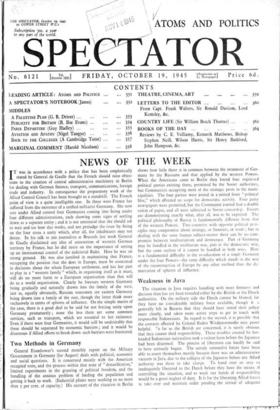Two Methods in Germany
General Eisenhower's second monthly report on the Military Government in Germany (for August) deals with political, economic and social questions. It is concerned mainly with the American occupied zone, and the process within that zone of "denazification," limited experiments in the granting of political freedom, and the handling of the anxious problem of feeding the population and getting it back to work. (Industrial plants were working to no more than 5 per cent, of capacity.) His account of the situation in Berlin shows how little there is in common between the treatment of Ger- many by the Russians and that applied by the western Powers. When the Americans came to Berlin they found four organised political parties existing there, permitted by the Soviet authorities, but Communists occupying most of the strategic posts in the muni- cipalities. The four parties were joined in a united front "political bloc," which afforded no scope for democratic activity. Four party newspapers were permitted, but the Communist journal had a double ration of paper, and all were subjected to Soviet censorship. Events are demonstrating exactly what, after all, was to be expected. The political philosophy of Russia is fundamentally different from that of the western Powers. Two countries with opposite political pr:n- ciples may compromise about strategy, or frontiers, or trade ; but in dealing with the same human subject-matter there can be no com- promise between totalitarianism and democracy. Part of Germany may be handled in the totalitarian way, part in the democratic way, but the same section of it cannot be handled in both ways. Here is a fundamental difficulty in the re-education of a single Germany under the four Powers—the same difficulty which stands in the way of the reconstruction of Europe by any other method than the de- marcation of spheres of influence.


























